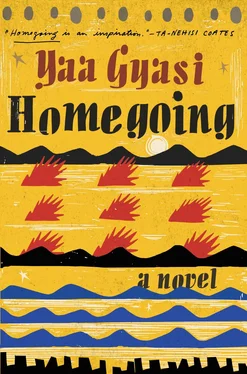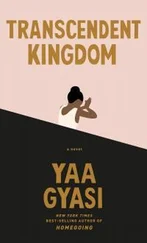Abena looked up. The man was dark and sinewy, his Twi broken or rusty, she couldn’t tell which. She took him in but could not place his face among any of the tribes she knew. “What is your name?” she asked. “Who are your people?”
The man smiled and shook his head. “It does not matter what my name is or who my people are. Come, let me show you the work we are doing here.” And because she was curious, Abena followed him.
He took her to a patch of dirt, a clearing that was waiting, begging, for something to be built there so that the city sprawl around it wouldn’t seem like a broken circle. At first Abena could not see much, but then more dark men with unplaceable faces walked over to the clearing carrying tree stumps for stools. Then a white man appeared. He was the first white man Abena had ever seen. Even though everyone whispered that there was white in her father, to her, he had always just looked like a lighter version of herself.
Here was the man the villagers really spoke of, the man who had come to the Gold Coast seeking slaves and gold however he could get them. Whether he stole, whether he lied, whether he promised alliance to the Fantes and power to the Asantes, the white man always found a way to get what he wanted. But the slave trade had finally ended, and two Anglo-Asante wars had passed. The white man, whom they called Abro Ni, wicked one, for all the trouble he had caused, was no longer welcome there.
And yet Abena saw him, sitting on the stump of a felled tree, talking to the tribeless dark men.
“Who is that?” she asked the man next to her.
“The white man?” he said. “He is the Missionary.”
The Missionary was looking at her now, smiling and motioning for them to approach, but the sun was beginning to set, ducking under the palm tree canopies that marked the west side of the city, and Ohene Nyarko would be waiting for her.
“I have to go,” she said, already pulling away.
“Please!” the dark man said. Behind him, the Missionary stood up, ready to come after her. “We are trying to build churches throughout the Asante region. Please, come find us if you ever need us.”
Abena nodded, though she was already running. When she got to the meeting spot, Ohene Nyarko was buying roasted yams from a bush girl. A girl who, like Abena, had come from some small Asante village, hoping to see something new, to change her circumstances.
“Eh, Kumasi woman,” Ohene Nyarko said. The girl had hoisted her big clay pot of yams back onto her head and was walking away, her hips keeping a steady, swaying pace. “You’re late.”
“I saw a white man,” she said, pressing her palm against the wall of someone’s compound as she tried to steady her breath. “A church man.”
Ohene Nyarko spit on the ground, sucked his teeth. “Those Europeans! Don’t they know to stay out of Asante? Did we not just beat them in this last war? We don’t want whatever it is they are trying to bring us! They can take their religion to the Fantes before we finish them all.”
Abena nodded absently. The men of her village often spoke of the ongoing conflict between the Asantes and the British, saying that the Fantes were sympathizers, and that no white man could come into their country and tell them that they no longer owned it. These were village people, farmers who had never seen war, most of whom had never seen the coast of the Gold Coast they so wanted to protect.
It was on a night like this that Papa Kwabena, one of the oldest men in their village, had started speaking about the slave trade. “You know, I had a cousin in the North who was stolen from his hut in the middle of the night. Swoosh! Just taken, and we don’t know by whom. Was it an Asante warrior? Was it a Fante? We don’t know. We don’t know where they took him!”
“To the Castle,” Abena’s father said, and everyone had turned to look at him. Unlucky. Who always sat in the back of the village meetings, holding his daughter in his lap as though she were a son. They allowed this because they pitied him.
“What castle?” Papa Kwabena asked.
“There’s a castle on the coast in Fanteland called the Cape Coast Castle. That is where they used to keep the slaves before they sent them away, to Aburokyire: America, Jamaica. Asante traders would bring in their captives. Fante, Ewe, or Ga middlemen would hold them, then sell them to the British or the Dutch or whoever was paying the most at the time. Everyone was responsible. We all were…we all are.”
The men all nodded, though they did not know what a castle was, what America was, but they did not want to look foolish in front of Unlucky.
Ohene Nyarko spit out a burned portion of the yam and put his hand on Abena’s shoulder. “Are you well?” he asked.
“I was thinking about my father,” she said.
A smile broke across Ohene Nyarko’s face. “Oh, Unlucky. What would he say if he saw you here with me now, eh? His precious ‘son,’ Abena, doing something he has long forbidden her to do.” He laughed. “Well, let me get you home to him now.”
—
They traveled quickly and quietly, Ohene Nyarko and his large, full frame making a way, tearing a path through terrain that had dangers Abena dared not think of. By the end of the second week, they could just make out the skyline of their own village, small though it was.
“Why don’t we rest here?” Ohene Nyarko asked, pointing to a spot just in front of them. Abena could tell that others had rested there before. There was a small cave that had formed from the ruin of fallen trees, and the space on the ground had been cleared to make room for it.
“Can’t we keep going?” Abena asked. She had begun to feel homesick for her mother and father. She had told them everything from the day she spoke her first word, and she could not wait to tell them about this, even though she knew her father would still be angry. He would want to hear it. Her parents were getting older, and she knew they had no time to harbor bad feelings.
Ohene Nyarko was already setting his things down. “It’s another day’s journey,” he said, “and I’m too tired, my darling.”
“Don’t call me that,” Abena said, dropping her own things to the ground as she sat down in the small tree cave.
“But you are.”
She didn’t want to say it. Instead, she wanted to force the words to stay inside her mouth but could feel them coming up her throat, pressing against her lips. “Then why won’t you marry me?”
Ohene Nyarko sat down next to her. “We’ve talked about that. I will marry you when I have my next big harvest. My parents always used to say that I shouldn’t marry a woman whose clan I didn’t know. They said you would bring nothing but dishonor to my children, if we had children at all, but they don’t speak for me anymore. I don’t care what the villagers say. I don’t care if your mother was thought barren until she had you. I don’t care that you are the daughter of a nameless man. I will marry you as soon as my land tells me that I am ready to marry you.”
Abena couldn’t look at him. She was staring at the bark on the palm trees, the rounded diamonds crisscrossing against each other. Each one different; each one the same.
Ohene Nyarko turned her chin toward him. “You must be patient,” he said.
“I have been patient while you married your first wife. My parents are so old that their backs have begun to curve. Soon they will fall like these trees, and then what?” She didn’t know if it was the thought of being alone without her parents or the fact of her present loneliness, but before she could fight them, tears were rolling down her face.
Ohene Nyarko placed his hands on both of her cheeks and wiped her tears with his thumbs, but they fell quicker than he could sweep them away, and so he used his lips, kissing the salty trail that had begun to form.
Читать дальше

![Ally Carter - [Gallagher Girls 01] I'd Tell You I Love You But Then I'd Have to Kill You](/books/262179/ally-carter-gallagher-girls-01-i-d-tell-you-i-lo-thumb.webp)










